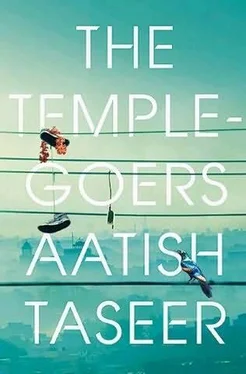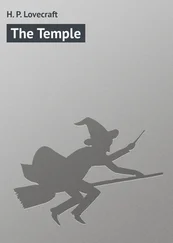Sanyogita sat on the white lace bedcover, her toes hanging off the edge. She was full of Delhi news. She told me of my old friends, her new friends, gay men she’d had lunch with, fashion parties and the agitation in Chamunda’s state. It was Holi in a few days; she broke the sad news to me that my mother’s sister was not having her party this year, as the metro had claimed her house. She’d organized instead for us to go to the Times of India party with Ra.
‘Ra?’
‘Ra. Rakesh. My friend the jewellery designer.’
She wiggled her head. Two earrings dangled happily. They were long, with a line of glassy, rectangular diamonds set around a many-faced greyish stone in a paisley shape. There was a single, prominent ruby at the ear. The effect of that colour, like a sudden red light on a misty day, was startling.
‘He gave them to me as a present,’ she said. ‘You know, that way people see them around as well. He’s just getting started, but he’s good, I think.’
‘Have I ever met him?’
‘I think so. Short, squishy, like a pincushion? Adorable.’
‘Maybe. And Delhi? What’s been going on here? Any new things?’
‘Delhi? Everything’s new. New roads, new buses, new metro, new restaurants, new neighbourhoods, new money, everything except new people.’
Then I saw that she felt bad. This was not the arrival she had planned. Our stilted conversation seemed to trouble her. She began flipping through the pages of the Times of India . Her hair fell around her. I thought of the study, and then I felt bad; I saw that she might have wanted to make love.
I got up from where I lay at the head of the bed and crouched behind her. For a few minutes we sat like that, like two pods about to hatch; I read the paper over her shoulder. There was a picture of the new green buses. Their orange electronic displays transformed their destinations. Saket, Rajouri Gardens, Sectorpur and Phasenagar, running across a black screen in English letters, seeming suddenly like international places, places people ought to know of. The passengers, once just a crowd, became distinct in the bright modern buses, with their sunny yellow grab handles. In the background was a weary colossus from the old days containing distressed passengers. It was grey and yellow with deep scratches along its flank and an exhaust pumping out brown smoke.
Some bureaucrats had decided that the new buses should have bus lanes. They imported whole a model from Bogotá. It advised that bus lanes be driven through the middle of crowded arteries. And so blue lanes, with little brushed-steel bus stops appearing at even intervals down their length, had been threaded through long stretches of roaring traffic. But what had worked in Bogotá was not working in Delhi. The crowds that mob the bus when it approaches in Delhi blocked traffic. The cars, already squeezed for space, were further deprived of a lane. They refused to adhere to the new rules. Young boys with orange vests and flashing batons were hired to enforce the new system. There were delays into the night. The picture showed a late-evening scene in which a car owner was abusing a policeman. The car’s headlights shone in his face. It was dark, haggard, on the verge of breakdown.
I was still looking at this scene of frustration when Sanyogita ran her fingertips along the edge of my face. I felt her body easily through her faded clothes. It was broad and soft, slightly damp. Her fig perfume mixed with Delhi smells of food and grime. I kissed her shoulder and came near something stronger.
‘Baby’s hard,’ she said with laughter and surprise.
I hated it when she laughed in these moments.
‘Why don’t we go to the big room?’ I said.
‘You want to!’
‘Yes.’
We walked to it through the corridors, reaching for each other in the afternoon gloom.
We made love simply and quickly in that outside room, overlooking the mango tree. She felt big and roomy. I longed to have her close around me, for there to be more friction on the edges. She was also dissatisfied. When I was finished, she climbed on top of my thigh. We did this often. I held her as she rocked up and down my thigh, moaning and muttering, ‘Baby, it’s so good,’ as though I was somehow responsible for what was little more than masturbation. Finished myself and oversensitive, they were minutes of disgust for me. When it was over again, we lay there with our legs spread out, the sun coming in. I felt fat. I squeezed my stomach into a mound with both hands.
‘I’m going to lose all this.’
‘Why, baby? You’re not fat.’
‘Perhaps, but now that I’m here, I’m going to join a gym and get a trainer.’
‘Really? What else are you going to do now that you’re here?’
‘Get an Urdu teacher and learn to read my grandfather’s poetry.’
‘Baby! I didn’t know your grandfather was a poet. The turbaned gentleman who was in the army?’
‘No, not him. My father’s father. He died when my father was six.’
‘Oh.’
Sanyogita didn’t like hearing about my father. She felt that his absence from my life was an unspoken source of pain whose emotional consequences she had inherited. To speak of it casually was almost to belittle the wrong she felt he had done my mother and me. She could be unforgiving in these matters.
I had thought I would return to my mother’s flat that evening, but Sanyogita dissuaded me.
‘Yes, stay here, baby,’ she said. ‘I don’t know what you’re doing staying in my aunt’s sex pad anyway.’
‘What?’
‘OK, this is totally confidential, and comes from my mother, who you know hates my aunt, but she told me that Chamunda uses your mother’s flat to meet lovers.’
‘What lovers?’
‘She has tons. There’s one in particular whom everyone calls the “French lieutenant”.’
‘Does my mother know about this?’
‘Of course, baby. Your mother’s the fixer.’
‘Fuck off.’
Sanyogita laughed out loud, then smiled thoughtfully as if she’d said something with more truth in it than she’d intended. ‘I think it’s great. If I was a high-profile politician, I’d like my close girlfriends to make sure I had some fun in later life, especially in this hypocritical society.’
‘Well, it’s settled, then.’
‘What?’
‘I’m never going back.’
‘Don’t! I’ll tell Vatsala to send for your bags.’
‘Junglee?’
‘Yes, yaar,’ the voice boomed down the telephone. ‘It’s a very sweet place. Not too expensive and the trainers are damn hot. I used to go myself in the promiscuous days.’
‘And now?’
‘Not so much now. Hubby doesn’t like it. What to do?’ She laughed uproariously. ‘I was a big slut, but just a one-man woman now. So sad! No?’
Mandira was a Bombay friend of Sanyogita’s now married in Delhi. Her father had died when she was a teenager and she’d had a difficult transition into adult life, namely a string of bad relationships through which Sanyogita had been a constant support. She was one of the people whom Chamunda had in mind when she sometimes said of Sanyogita, ‘She likes birds with broken wings.’ And it was Mandira who recommended Junglee when I was looking for gyms in the area.
In the days after I moved in with Sanyogita, I became anxious about routine. I had never worked as a writer before. I was back in the place where I grew up, supposedly writing about another place. I was worried that my ideas would slip away from me. I sometimes woke up with nightmares about having to call the agent in New York with the news that I had gone blank.
My imagined routine consisted of waking up at seven; being at my desk by eight; working till one, then having lunch. After that, I would sleep for half an hour, read in English till three, then from three to five read my grandfather’s poetry in Urdu. (I still hadn’t found a teacher but had spoken to someone at the Ghalib Academy, a crumbling, art-deco building with pink walls and smelly carpets, who promised me a teacher would call in the next few days.) At six, I would either do yoga with Sanyogita in the flat or go for a walk in Lodhi Gardens. I wanted to be in bed by ten or eleven. I refused to go out at night until I had made a start with the revisions.
Читать дальше












